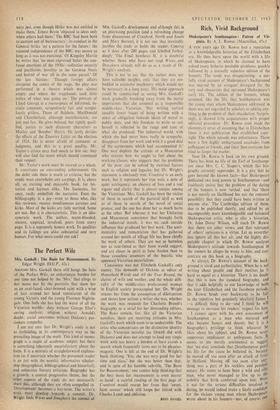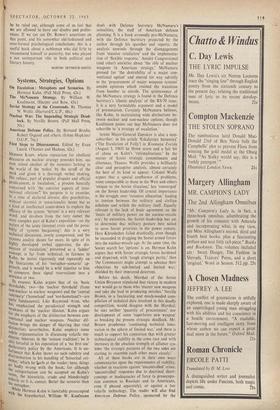Rich, Vivid Background
Shakespeare's Southampton : Patron of Vir- ginia. By A. L. Rowse. (Macmillan, 45s.)
A I:1:w years ago Dr. Rowse had a reputation as a knowledgeable historian of the Elizabethan era. He then burst upon the world with a life of Shakespeare, in which he claimed to have solved many hitherto insoluble problems, quickly followed by a textually valueless edition of the Sonnets. The result was disappointing: a use- fully vivid account of Shakespeare's background was marred by an arrogant disregard for the very real obscurities that surround Shakespeare's early life. The edition of the Sonnets, which assumed, like the life, that Southampton was the young man whom Shakespeare addressed in them was not regarded by scholars as adding any- thing to, the problem of .their elucidation. Surpris- ingly, it'shovVed little acquaintance with proper editorial procedure--Dr. Rowse even made the elementary error of assuming that in Elizabethan times it was publication that established 'copy- right. The whole episode was unfortunate. There were a few highly embarrassed accolades from colleagues or friends, and since then everyone has tried to forget the matter,
Now Dr. Rowse is back on his own ground. There has been no life of the Earl of Southamp- ton since Mrs. C. C. Stopes's, which this bio- graphy certainly supersedes. It is a pity that he goes beyond the known facts—that Shakespeare dedicated two long poems to Southampton—and fruitlessly insists that the problem of the dating of the Sonnets is now 'settled,' and that 'there is not merely no likelihood but not the remotest possibility that they could have been written to anyone else.' The Cambridge edition of them, due to be published shortly, and edited by an incomparably more knowledgeable and balanced Shakespearian critic, who is afso a historian, Dr. John Dover Wilson, will teach Dr. Rowse that there are other views, and that tolerance of others' opinions is a virtue. Let us neverthe- , less ignore all this hot air, and the highly dis- putable chapter in which Dr. Rowse analyses
Shakespeare's attitude towards Southampton in the sonnets he alleges he wrote to him, and con-, centrate on this book as, a biography.
As always, Dr. Rowse's account of the back ground is vivid and authoritative. When he is not writing about people and their motives he is hard to equal as a historian. There is no 'doubt that this is now the standard biography, and that it adds helpfully to our knowledge of both the later Elizabethan and the Jacobean periods. Dr. Rowse bends over backwards to be fair to the repulsive but genuinely idealistic James I —a difficult thing to do—and I think he will manage to increase his readers' respect for him.
1 cannot agree with his own assessment of Southampton as a man who matured and 'who became honest and decent; but it is a biographer's privilege to think whatever he likes about his subject, and Dr. Rowse never suppresses unpleasant or ambiguous facts. It :seems to me merely sentimental to suggest that 'we may conclude that [Southampton gavel his life for the cause he believed in,' because he moved off too soon after an attack of fever in Holland. Moving off too soon after anY' thing was a part of his reckless and petulant nature. He seems to have been a wild and silY man, who never managed to live up to the nobility that birth conferred upon him. Were it not for the serious difficulties involved ig dating, he would indeed make a likely candidate for the vicious young man whom Shakespeare wrote about in his Sonnets—nor, of course, can
he be ruled out, although some of us feel that we are allowed to have our doubts and prefer- ences. If we cut out Dr. Rowse's assertions on this point, and his somewhat old-fashioned and over-formal psychological conclusions, this is a useful book about a nobleman who did little to recommend himself to posterity, but who played a not unimportant role in both political and literary history.
MARTIN SEYMOUR-SMITH































 Previous page
Previous page